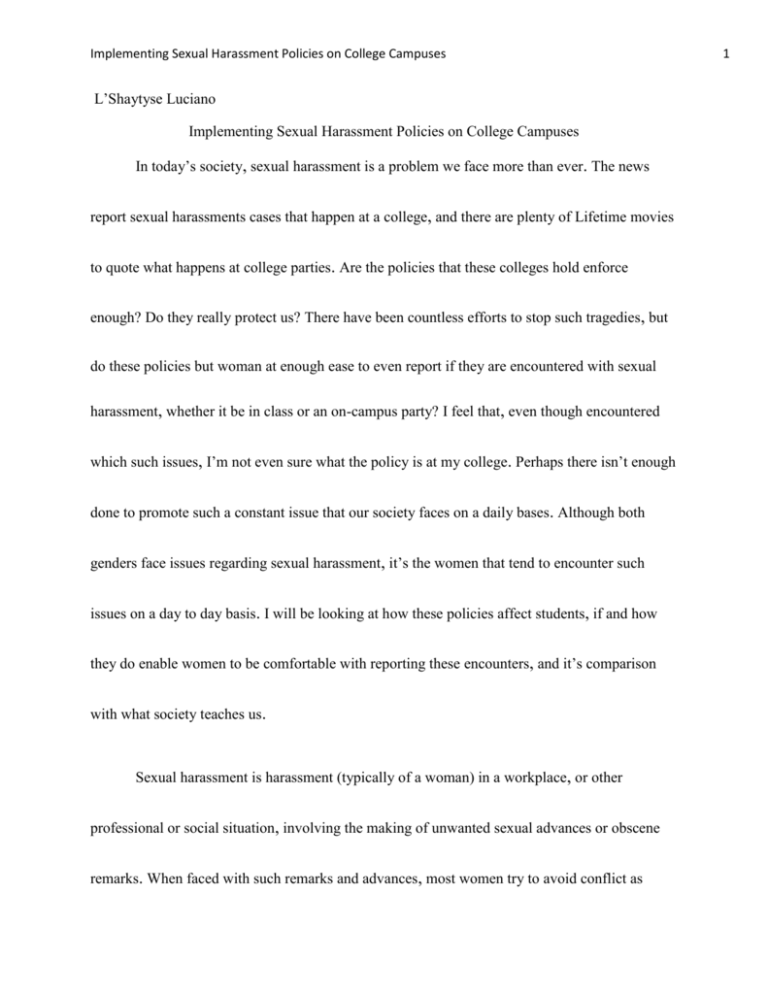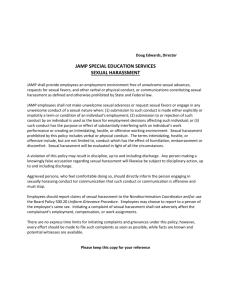
Implementing Sexual Harassment Policies on College Campuses
L’Shaytyse Luciano
Implementing Sexual Harassment Policies on College Campuses
In today’s society, sexual harassment is a problem we face more than ever. The news
report sexual harassments cases that happen at a college, and there are plenty of Lifetime movies
to quote what happens at college parties. Are the policies that these colleges hold enforce
enough? Do they really protect us? There have been countless efforts to stop such tragedies, but
do these policies but woman at enough ease to even report if they are encountered with sexual
harassment, whether it be in class or an on-campus party? I feel that, even though encountered
which such issues, I’m not even sure what the policy is at my college. Perhaps there isn’t enough
done to promote such a constant issue that our society faces on a daily bases. Although both
genders face issues regarding sexual harassment, it’s the women that tend to encounter such
issues on a day to day basis. I will be looking at how these policies affect students, if and how
they do enable women to be comfortable with reporting these encounters, and it’s comparison
with what society teaches us.
Sexual harassment is harassment (typically of a woman) in a workplace, or other
professional or social situation, involving the making of unwanted sexual advances or obscene
remarks. When faced with such remarks and advances, most women try to avoid conflict as
1
Implementing Sexual Harassment Policies on College Campuses
much as possible, and tend to avoid taking legal actions towards people to avoid the hassle and
stigma that comes with being “that girl who pressed charges”. “ I have come to believe that an
ironically formal emphasis on informal resolutions may (a) push a victim into making hasty
amends instead of dealing directly with the discrimination and (b) downplay the legal
implications of sexual harassment and portray it more as an impropriety than an illegal act”
(Mitchell 118). This statement ties into how society has morphed our way of thinking, instead of
saying that he should have not touched her, it is said that she should not have dressed in a way
that provoked hi or lead him on. Not enough is enforced in these policies, even on small
campuses. The seriousness associated with sexual harassment should be enforced to the point
where said student feels that they can go through taking an action and not have to worry about
dealing with harassment from peers. Society has made it acceptable to treat sexual harassment as
an impropriety instead of a serious legal issue.
“Informal processes detailed in the policies emphasized “working things out,” thereby
reinforcing a conception that sexual harassment is not as much a violation of civil rights as a
conflict or emotional problem to be worked through for both parties” (Mitchell 120). In this
particular policy, it shows everything wrong with colleges and their view on sexual harassment,
and the serious clause that has been created within our society. Humans tend to follow example
2
Implementing Sexual Harassment Policies on College Campuses
that are given around them, they follow the social norms that have been put into place by their
peers, but that does not make it acceptable to have sexual harassment listed under something that
can be fixed with a “sorry” instead of taking legal action. “Informal resolution should be an
alternative or a solace but never road-lock to formal complaints” (Mitchell 121). Although both
the perpetrator and the victim will need emotional support going through a situation such as
sexual harassment, but it should not be the only go to, and he victim should be able to take legal
action and not feel stuck with what her/his college campus enforces in its policy. “Furthermore,
if sexual harassment involves inappropriate behavior, the solution may be to counsel-not to
punish-the perpetrator” (Mitchell 120). No matter what the situation, a victim should not feel as
though if they do report an incident, that the only action taken towards the perpetrator would be
counseling, and not legal action, perhaps the perpetrator is completely aware of what he is doing,
but in no means is he worried because all he will receive is a slap on the wrist.
Who is to say that the young man isn’t just joking around with the young lady? Perhaps
she is being stuck up to just take a joke? A young man in college knows very well what is and
isn’t inappropriate, and when someone is made to feel uncomfortable, it is written all over their
face. “Thus, in a situation in which peer sexual harassment may occur, if a man is unsure about
3
Implementing Sexual Harassment Policies on College Campuses
how to interact with a woman and is not provided with information about the woman’s likes or
dislikes, he may use available social cues from peers to assess the acceptability of engaging in a
sexually harassing act” (Angelone 189). It is sad to think that picking up on social cues is an
example as to why sexual harassment is a go to. This sort of thinking does not only apply to
college campuses, but all over. Social norms have made it okay for girls to be sexually harassed,
and that is something that is unacceptable in our society.
“These new guidelines required all educational institutions to adopt and publish
grievance procedures for all sex discrimination complaint, including allegations of sexual
harassment” (Bursik & Gefter 335). To see that an effort has been made regarding sexual
harassment is a huge step forward but there are other underlying factors in our society that does
need to be worked on. To change a policy is fine, but that policy needs to be enforced.
Throughout my college years, months of roaming the halls, going to two orientations, spending
time in the class room, I can honestly say that talk about sexual harassment has not been
something that I have been exposed too. I don’t know how to protect myself, whether what a
young man says to me is sexual harassment or not, and that, for colleges, is not a good thing.
They should offer and pride themselves on protecting the females, just changing a policy is not
4
Implementing Sexual Harassment Policies on College Campuses
enough, you have to put it out there and let the young ladies know what they can do to feel more
protected and comfortable within their college experience. “Perhaps it is not surprising that,
despite educational interventions and public debate, perceptions of sexual harassment appear to
have remained remarkably stable” (Bursik & Gefter 347). It is something that should be
surprising, more things should be done to show young adults from right and wrong, especially
when it pertains to respecting their peers.
“Specifically, individuals why sexually harassed others would be characterized by
insecure attachment and would be low in Agreeableness, Conscientiousness, and Openness”
(Menard 774). Although it is internal issues that affect perpetrators, it still is society’s job to
make sure that it is understood that what is done is wrong, and not the correct way. Harassing
someone, no matter what it may be, will n ever be acceptable, and it’s sad that it happens so
commonly on college campuses, and not just among peers, but teacher to students as well.
Perhaps we need more classes on sexual harassment than on Shakespeare and Game of Thrones.
It is not okay that there is nothing really being done to help those young ladies who find
themselves in such heinous situations, and when they do want to report it, the only justice that
5
Implementing Sexual Harassment Policies on College Campuses
they could find is their perpetrator receiving counseling. It should be that they receive the
counseling while going through the legal action to make sure he doesn’t do such a thing again.
6
Implementing Sexual Harassment Policies on College Campuses
Bibliography
Ménard, K. S., Shoss, N. E., & Pincus, A. L. (2010). Attachment and Personality Predicts
Engagement in Sexual Harassment by Male and Female College Students. Violence &
Victims, 25(6), 770-786. doi:10.1891/0886-6708.25.6.770
Mitchell, F. (1997). Keeping it all in the family: Sexual harassment policies and
information resolution in small.. NWSA Journal, 9(2), 118
Bursik, K., & Gefter, J. (2011). Still Stable After All These Years: Perceptions of Sexual
Harassment in Academic Contexts. Journal Of Social Psychology, 151(3), 331-349.
doi:10.1080/00224541003628081
Angelone, D. J., Hirschman, R., Suniga, S., Armey, M., & Armelie, A. (2005). The
Influence of Peer Interactions on Sexually Oriented Joke Telling. Sex Roles, 52(3/4), 187-199.
doi:10.1007/s11199-005-1294-4
7









